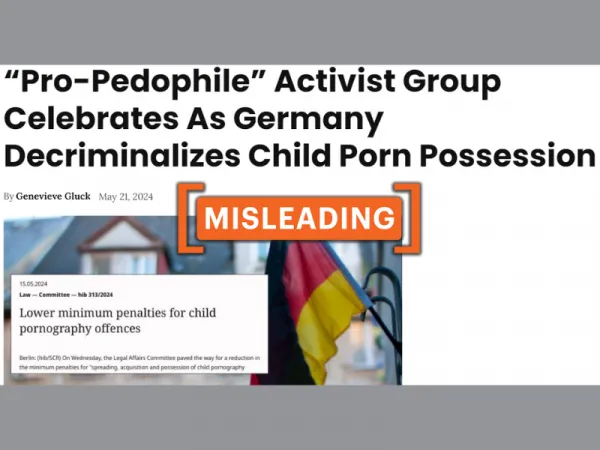By: Siri Christiansen
May 23 2024
 Screenshot of a headline from an online news outlet that has been widely shared on social media. Source: Reduxx (Modified by Logically Facts)
Screenshot of a headline from an online news outlet that has been widely shared on social media. Source: Reduxx (Modified by Logically Facts)
Germany has reduced the minimum sentence for this offense, but it will remain an unlawful act punishable by imprisonment.
What's being claimed?
Some social media users are claiming Germany's Parliament has voted to decriminalize the possession and distribution of child pornography.
"Every pedophile in the world is going to go to Germany," one person says in a TikTok video that has gained over 470,000 views within one day of posting. "You just made it so much more dangerous for children all over the world. (...) All [Child Sexual Abuse Material] websites are going to relocate to Germany."
The claim arises from the headline of a viral X (formerly Twitter) post by the self-described "pro-woman" and "pro-child safeguarding" news outlet Reduxx, which has more than 3.3 million views. The claim has been widely shared across social media platforms, including Facebook (here), TikTok (here), and X (here, here).
Source: X/Facebook(Modified by Logically Facts)
What's happened?
On May 15, the German Parliament's Legal Affairs Committee passed an amended version of a bill calling for a reduction in the minimum penalties for dissemination, acquisition, and possession of child pornographic content.
The minimum penalty will be cut from one-year imprisonment to three months for possession and acquisition of child pornographic content and six months for distribution. Such offenses will, therefore, be classified as misdemeanors and not felonies.
The maximum penalties remain intact: up to five years for whosoever disseminates, publicly displays, or makes accessible; produces, obtains, supplies, stocks, or imports or exports child pornography; or undertakes to obtain child pornography on behalf of another person. An additional maximum imprisonment of ten years can be imposed on anyone who "acts on a commercial basis or as a member of a gang that aims to continue commissioning such offenses and the child pornography reproduces an actual or realistic activity."
The amendment was introduced by Germany's Cabinet, which explained in a statement earlier this year that the prior one-year minimum sentence, introduced in 2021, had proven too inflexible and had unfairly impacted innocent people. Justice Minister Marco Buschmann said at the time that those who had received child pornographic material involuntarily, for instance, in a WhatsApp group chat, or obtained it as evidence to alert affected parents, risked a one-year prison sentence under the existing regulation. Reducing the minimum sentence would enable courts and prosecutors to respond proportionately to each case, Buschmann argued.
The amendment gained broad support with votes from the Social Democratic Party of Germany (SPD), Alliance 90/The Greens, the liberal Free Democratic Party, and The Left. The Christian center-right union CDU/CSU and the far-right party Alternative für Deutschland abstained.
Is this a decriminalization?
No. Section 12 in Germany's Criminal Code defines felonies as "unlawful acts punishable by a minimum sentence of one year's imprisonment," and misdemeanors as "unlawful acts punishable by a lesser minimum term of imprisonment or by fine." A misdemeanor is, therefore, still an unlawful act.
A decriminalized offense is one in which all criminal sanctions have been removed. The offense remains illegal, but the offender will not be prosecuted, and the penalty ranges from no punishment to a civil fine. Since Germany still punishes the possession, acquisition, and distribution of child pornography with imprisonment, it has not been decriminalized.
Dr. Kirstin Drenkhahn, professor of Criminal Law and Criminology at Freie Universität Berlin, told Logically Facts that German terms for felonies and misdemeanors do not have the same meaning and impact as in Anglo-American law, and emphasized that misdemeanors are still punishable with imprisonment. She explained that the amendment does, however, open up the possibility of waiving prosecution and stopping the proceedings so that the case won’t appear in the suspect’s criminal record.
This will be used for “cases that all experts want to keep out of the courts” – such as juveniles around the minimum age of criminal responsibility posting nude photos of themselves in WhatsApp group chats, or classmates and adults forwarding such photos to parents or teachers to alert them – and which under the legislation introduced in 2021 would have to be pursued and indicted.
“These cases fall under s. 184b para. 1 Criminal Code, but at least for German experts and criminal justice practitioners, it is obvious that they don’t belong in a criminal court,” Dr. Dreknhahn said. “These cases are also using resources of prosecution services and courts that should better be used for ‘real’ child pornography cases. But in 2023, of the 23,578 suspects of an offense according to s. 184b para. 1, about 4,200 were young persons under the age of criminal responsibility and about 5,800 were minors under 18.”
In other words:
“The mere possession – as in a picture materializes in my apartment and now I have it – is not a crime, but the production, trafficking, preparations to distribute and all other actions around getting access and providing access are a crime,” Dr. Drenkhahn concluded.
The verdict
Germany has reduced the minimum sentence for the possession, acquisition, and distribution of child pornographic materials, but it remains illegal and punishable with imprisonment. Therefore, it has not been decriminalized, and we have rated the claim as misleading.